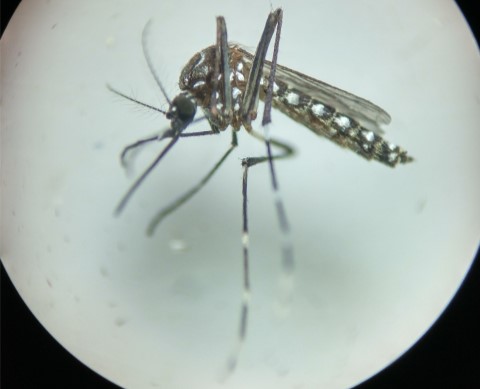
PALMDALE – Aedes aegypti — an invasive species of mosquitoes known to transmit diseases like yellow fever, dengue fever, chikungunya, and Zika virus — has been detected in two new locations in Palmdale, according to the Antelope Valley Mosquito and Vector Control District.
The invasive mosquitoes were identified in samples collected near 30th Street East and Avenue R and near 35th Street East and Avenue R, according to a news release from AVMVCD.
The District had not detected Aedes mosquitoes in these locations prior to this identification, said District entomologist Karen Mellor.
“This type of mosquito was first discovered in the Antelope Valley in October of 2018. We have since detected it several more times during the 2019 season, and again this year. Some detections were in the same areas as previous years, but we have also identified them in several new areas of town during the 2020 season,” Mellor said.
Aedes aegypti is a small black and white mosquito that feeds almost exclusively on humans, biting all day long, unlike the native Culex mosquitoes that generally bite during dusk and dawn.
Female Aedes mosquitoes will lay eggs in small containers, such as vases, buckets, pots and plant saucers, just above the waterline. The eggs can dry up and survive for six or more months, waiting for the container to re-flood so they can hatch. Aedes mosquitoes are typically introduced into new areas by bringing in containers from other areas that contain the eggs.
Aedes aegypti have the potential to carry very different diseases than native Culex mosquitoes and are known transmitters of yellow fever, dengue fever, chikungunya, and zika virus; but “although these mosquitoes have the potential to carry these diseases, there is currently nothing to indicate that local transmission occurring,” said District Manager Cei Kratz.
“Keeping mosquito populations low remains of utmost importance due to the potential for these diseases to make their way into the mosquito population,” Kratz added.
Authorities have increased mosquito surveillance in target areas and will continue to place traps that are designed to attract egg-laying Aedes mosquitoes, according to District officials.
Once trapped, the mosquitoes are contaminated with larvicide. When they leave the trap, they spread larvicide to several breeding sites around the trap which targets larvae in small and hard to find breeding sources. The adult mosquito also gets infected with a mosquito-specific fungus that kills her before she can spread diseases.
The District is urging residents to do their part to protect themselves from mosquito bites by following these recommendations:
- Wear EPA registered ingredients, such as DEET, picaridin, oil of lemon eucalyptus, or IR3535 to exposed skin and/or clothing (as directed on the
product label). - Wear long-sleeve shirts, long pants, socks and shoes when mosquitoes are most active.
- Be sure windows and door screens are in good repair to prevent mosquitoes from entering the home.
- Inspect yards for standing water sources and drain water that may have collected under potted plants, in birdbaths, discarded tires, and any other items that could collect water.
- Check rain gutters and lawn drains to make sure they aren’t holding water and debris.
- Clean and scrub bird baths and pet watering dishes weekly.
- Check indoor plants that are kept in standing water for mosquito activity (i.e. Bamboo and Philodendron)
- Report any day-time biting mosquitoes to the Antelope Valley Mosquito & Vector Control District at 661-942-2917.
To stay up-to-date on mosquito-related information, visit www.avmosquito.org or call the Antelope Valley Mosquito & Vector Control District at 661-942-2917.
[Information via news release from the Antelope Valley Mosquito & Vector Control District.]
–